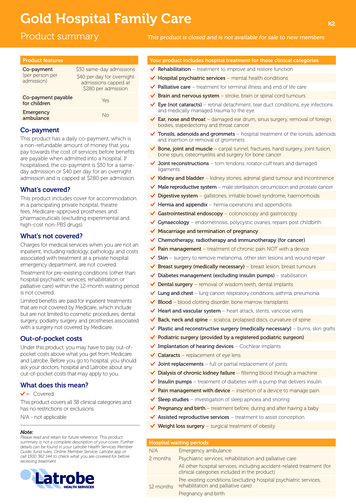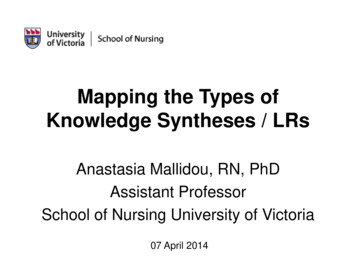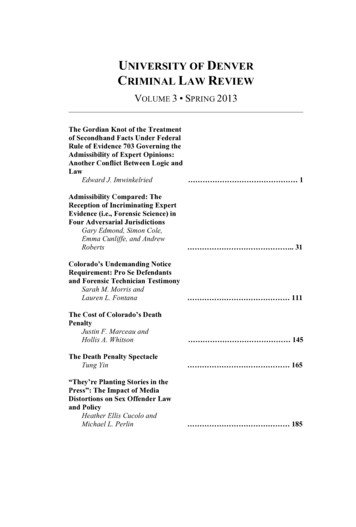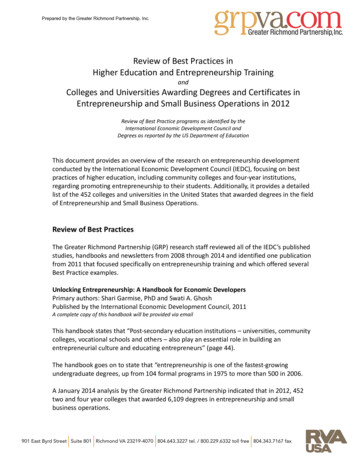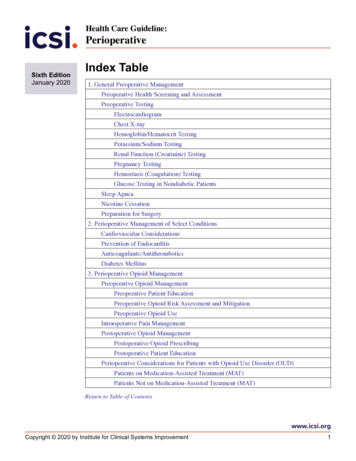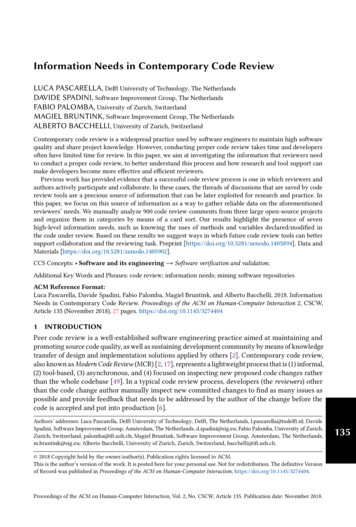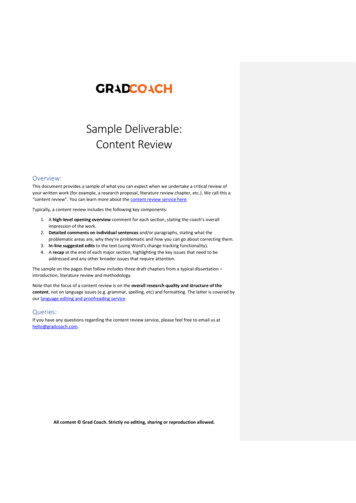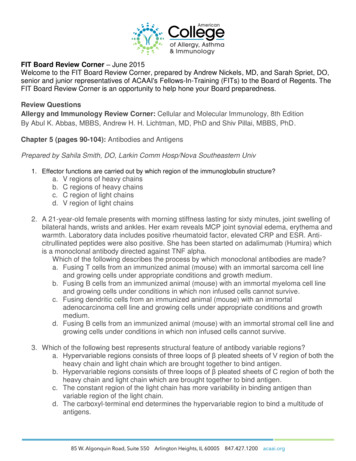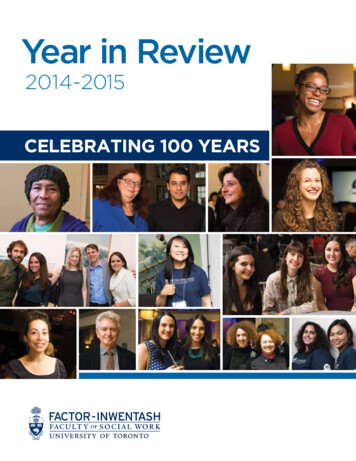
Transcription
Year in Review2014-2015CELEBRATING 100 YEARS
It has been an incredible year. A year of celebrating, a yearof honouring this Faculty’s first century of accomplishmentand a year of looking ahead with great anticipation to ournext century.The Opening Event at the Royal Ontario Museum was aninspiring way to begin. Celebrating there together with allof you, I could feel the passion and the pride. Then, a fewdays later, the Honourable Margaret Norrie McCain gave adynamic inaugural talk for the Distinguished Speaker Series.It was a privilege to hear Margaret – who has led the wayon this cutting edge issue as a champion of early childhoodeducation – speak about human development. The BerthaRosenstadt Trust Showcase was another of the year’shighlights. It was wonderful to be part of the dialogue whenour Faculty’s field placement partners shared ideas anddiscussed the research they are pursuing.Thank you for being such an important part of this past year.We want to thank our Chairs, our Honorary Chairs and themany people who helped to make our 100th AnniversaryYear such an incredible success. We are grateful to all ofyou – alumni, supporters, faculty, staff, students, emeritiprofessors, field instructors, community partners and friends.The Factor-Inwentash Faculty of Social Work’s strong pasthas positioned us to be a global leader, as we take on thecritical challenges that society will face over the next century.It has been an enormous pleasure to celebrate with you.100th ANNIVERSARY LEADERSHIPFaye MishnaDean, Factor-Inwentash Faculty of Social WorkUniversity of Toronto2A Celebration of Our Students4The Year That Was6Remembering Doreen Winkler7New Faculty Appointments8An Incredible Year12 We’re Asking Big Questions aboutBig Issues14 Honours and Achievements15 Mental Health and Social WorkCollaboration CreatesCross-University Synergy15 Institute for Life Course and AgingMoves to the Faculty16 J D/MSW Student Persia EtemadiDrafts High School Curriculum onForced Marriage17 The Buzz: Mobilizing Knowledgeat the Bertha Rosenstadt TrustShowcase; Educating andEngaging Learners at ContinuingEducation; Black History Month;Equity in the CityHONORARY CHAIRSGordon CressyLynn FactorSheldon InwentashANNIVERSARY CHAIRSTammy BalitskyBryan KeshenRashaad VahedOPENING EVENT COMMITTEEChairsEileen FarrowBeth WeingardenCommittee MembersLynn FactorHeather GotliebWanda HoCONTENTSThank YouWe are enormously grateful to all the supporters, volunteers, faculty, alumni, students, staff, friends,community partners and countless others who have contributed so much over the past year. Thankyou for the endless hours, for the planning, for the great ideas and for all your support. And mostof all, thank you for celebrating with us.With best wishes,Now, we are launching our next 100 years with a symposiumthat truly reflects what our Faculty is known for. We arebringing people together from across communities to exploresome of today’s most relevant and cutting edge challenges.1It’s been an amazing year and we want to say a huge thank you to all the wonderful people whohelped to make our 100th Anniversary Year celebrations such a success.18 June 25 Symposium: LaunchingOur Next 100 Years19 Faculty Members Leave a LastingLegacy: Professor Barbara Fallonand Professor Sheila Neysmithestablish scholarships20 Numbers That CountENDOWED SPEAKERS SERIESChairsEileen McKeePeter Murchison (Vice Chair)Ed ShaulCommittee MembersKelsen ChauJessica HarveyZahida JanmohamedJudy NewmanLinda SuttonGlenn ThompsonLorie Shekter-WolfsonATC (FIELD INSTRUCTORS)Illana PerlmanCLOSING EVENTChairMarina MammonCommittee MembersKanjana BrodieValerie GroysmanBiju MathaiNicole PachecoSandy RaoMEDIA/MARKETINGSheryl TrachterAmanda YoungJD/MSWChairJodi KaimanCommittee MembersTiffany LauCheryl MilnePROMOTIONS & GIFTSChairRosemarie JohnsonCommittee MembersMelanie LeanKelly MandarinoSamantha RobinsonCOMMITTEE MEMBERSEileen DolmanMabel HoSherlyn HuAngelique JenneyColleen Kelly2015 YEAR IN REVIEW 1
ACelebrationof Our StudentsSpring Convocation June 10, 20150101 Tracy Amponsah Ampofoh and her mother02 Shauna-Lee Regular, Travis Marks and Lauren Kussen03 Kowther Abbas and Natasha Ramzan and families04 Bailey Hollister and family05 Jenna Rines and Jenny Liu06 Keresa Bailey and Chantelle Brown-Kent0204030506
THE YEAR THAT WASTHE YEAR THAT WAS5 BooksALUMNI GATHER IN THE100TH ANNIVERSARY YEAR FORTHE 2015 SPRING REUNIONWhen alumni came together on May 27, 2015 at the Facultyfor the 2015 Spring Reunion, it was a great chance tomingle, re-connect and network during the Faculty’s 100thAnniversary Celebratory Year. The lively evening featured araffle of recent publications by FIFSW faculty, alumni andstudents (which were displayed in a Book Expo).PUBLISHED THIS PASTYEAR BY FACULTY,ALUMNI AND STUDENTSDID YOU KNOW?The Alumni Association wasfounded immediately after theDepartment of Social Service’sfirst graduation ceremony inMay 1915. That same day, inthe Household ScienceBuilding, proud alumni heldtheir first meeting.AWARDS RECOGNIZEOUTSTANDING ALUMNI MENTORSEarlier in the evening, at the FIFSW AGM, MSW grads had the chance to thank publicly the AlumniMentors who have made such a difference as they prepare to join the profession. The OutstandingAlumni Mentor Awards are a wonderful way for grateful new grads to acknowledge just how muchthe help they have received has meant to them.“Mark was incredibly generous with his time and enthusiasticabout being a mentor. I now feel more comfortable movingforward towards finding employment as a social worker,thanks to him.”MARK McLAREN WAS NOMINATED BY NATALIE DZUDOVICH-RAMIREZ (MSW2015).“I was able to secure an interview for a position, whichHeather helped me prepare for and generously was availablefor debriefing afterwards.”“Alex offered to look over my cover letter and resume andoffer feedback. I was blown away by the amount of time andeffort that she so clearly put into reviewing my materials.”ALEX KOBAYASHI WAS NOMINATED BY APRIL PISANI (MSW 2015).“Joey always demonstrated a positive attitude and actedas a positive role model in showing me what it takes tobe productive and successful in private practice, includinglessons learned.”JOEY CRUMP WAS NOMINATED BY SYLVIA SIKAKANE (MSW 2015).01MARION BOGO, ELLEN KATZ, CARMEN LOGIEAND MARY RAWLINGS, “USING SIMULATIONIN ASSESSMENT AND TEACHING: OSCEADAPTED FOR SOCIAL WORK.” (COUNCIL ONSOCIAL WORK EDUCATION PRESS.)02MARGARET GIBSON, “QUEERINGMOTHERHOOD: NARRATIVE AND HERETICALPERSPECTIVES.” (DEMETER PRESS.)03WILBURN HAYDEN, “APPALACHIAN BLACKPEOPLE: IDENTITY, LOCATION ANDBARRIERS.” (91 SOUTH.)04FAYE MISHNA AND MELISSA VAN WERT,“BULLYING IN CANADA.” (OXFORDUNIVERSITY PRESS.)05 DAN ZUBERI, “SCHOOLING THE NEXTGENERATION: CREATING SUCCESS INURBAN ELEMENTARY SCHOOLS.”(UNIVERSITY OF TORONTO PRESS, SCHOLARLYPUBLISHING DIVISION.)9NEW PHD THESESEXAMINING CRITICAL ISSUESThis past year, 9 PhD students successfully defendedtheir theses and then graduated in the Fall of 2014 or theSpring of 2015 Convocations.Margaret Gibson’s thesis focused on LGBTQ parents’ experiencesin engaging with special needs service systems.Pamela Grassau’s thesis focused on mothers and daughtersnegotiating their end-of-life dialogues.Dorothy Hasinoff explored declines and regains in income andhealth status among mid- and later-life Canadians.Daphne Jeyapal’s thesis examined the 2009 Tamil diasporaprotests in Canada.Marjorie Johnstone’s thesis explored diverging and contestingfeminisms in early social work history in Ontario from 1900 to 1950.Jennifer Root focused on conceptualizing safety among womenwho experience intimate partner violence.Sarah Serbinski explored the experience of young adult sons anddaughters who have grown up in families that foster.Adriana Shnall examined the experiences and coping strategies ofspouses of people with early-onset dementia.Hedy Anna Walsh explored cultural considerations in the deliveryof homecare services.HEATHER PURDON WAS NOMINATED BY DANA FOTIADIS (MSW 2015).“Alex helped guide my thinking and decision making indialogue, encouraging collaborative learning that went bothways. She was very respectful and I felt that she reallylistened to me and was supportive of my goals.”ALEXANDRA WILSON WAS NOMINATED BY NAYLEN GONZALEZ(MSW 2015).“It was immediately clear to me that Shayna was an ally fromthe first email. She had confidence in my abilities and did notthink twice about making herself available to me, as well asgiving me support and advice.”SHAYNA KULMAN-LIPSEY WAS NOMINATED BY DANA ISENBERG (MSW 2015).4 2015 YEAR IN REVIEW“With Greg’s encouragement, I got a job offer after mysecond interview in April. I am now working as a MedicalSocial Worker on a Family Health Team, all thanks to mymentor Greg.”GREG MANN WAS NOMINATED BY RUICHUN TANG (MSW 2015).Professor Sheila Neysmith, a highly valued member of our Faculty, will become anEmeritus Professor as of July 1, 2015. An integral part of the Factor-Inwentash Facultyof Social Work community for many years, she brought a passion and commitment to hermany roles: scholar, author of numerous books and publications, professor, Director ofPhD Studies, RBC Chair in Applied Social Work Research, Associate Dean of Research,Director of Research and a valuable member of the University’s Research Advisory Board.2015 YEAR IN REVIEW 5
When former Alumni President Doreen Winklerdied on October 15, 2014, our Faculty lost atrusted friend and adviser.NEW FACULTYAPPOINTMENTSBRYN KINGAPPOINTED ASSISTANT PROFESSORRememberingDoreen WinklerFor many years, Doreen was an important part ofour Faculty. As Alumni President, she invigoratedthe association – attendance at events rosesubstantially – and once she stepped down,we continued to rely upon her judgement, hercompassion, her advice, her tenacious will and herability to get things done.That was the way it was with Doreen. She was anabsolutely essential part of so many activities bothat our Faculty and across the University. Whenan external reviewer came to the Faculty, Doreenwas the first person we arranged for them tomeet. She represented the alumni on the FacultyCouncil, was a member of the College of Electors,was deeply involved in our 100th anniversarypreparations and instrumental in creating aseries of talks in which PhD students showcasedtheir research.One of her many successes as Alumni Presidentwas to help fundraise for a scholarship. In typicalDoreen style, she began by saying that shewouldn’t be any good at it. And of course it wasjust the opposite. In her no-nonsense, direct anddown-to-earth way, she became the scholarship’sdriving force, taking it far beyond its target –6 2015 YEAR IN REVIEWwhich was how she tackled everything in a life ofconsiderable accomplishment.Born on a farm in Kelvington, Saskatchewan,Doreen moved to Winnipeg to attend a schoolfor the blind at the age of seven, eventuallyreceiving a BA from a college in Brantford,Ontario and her MSW and PhD at our Faculty.(She credited her mother, who had not receivedan education herself, for pushing her to get one.)Over a distinguished and varied social work career,Doreen made an important contribution to thepromotion of social justice and human rights. Shewas a member of the Immigration and RefugeeBoard from 1988 to 1999 and a recent memberof the Ontario Review Board. She received theCanadian Association of Social Workers’ 2008Distinguished Service Award for Ontario.Doreen was always a lot of fun at parties andshe was missed at our October 29th anniversarycelebration. Invariably, at any Faculty event, shecould be found huddled in a corner, deep inconversation with a student. She had a specialquality – she spoke straight from the heart – andwe will miss her very much.Dr. Bryn King has been appointed Assistant Professor at theFactor-Inwentash Faculty of Social Work effective July 1, 2015.King received her PhD from the University of California, BerkeleySchool of Social Work in August 2014 and her MSW at the NewYork University Silver School of Social Welfare. She was in practicefor over 16 years, working primarily with children and families.“I’m really impressed by the Faculty’s focus on practice,” King says.“One of the things that drew me to the Faculty is that they are onthe cutting edge of teaching practice. It was important to me to joina place where people are passionate about their work.”Most recently King was a researcher at the California Child WelfareIndicators Project/Center for Social Services Research School ofSocial Welfare at the University of California, Berkeley. King saysthat her scholarship and research focus grew directly out of hermany years in practice. “My primary goal in my research is to assessthe well-being of older children and adolescents who come intocontact with child welfare and spend time in foster care,” she says.“We need to understand more fully what happens when thesechildren and adolescents are in the system,” King says. “We don’tknow enough about their experience of being in foster care orabout the impact our interventions are having. We need to generateknowledge so we can improve and refine policies and services, withthe aim of improving outcomes for these youth and their families.”TOULA KOURGIANTAKISAPPOINTED LECTURER ANDSIMULATION EDUCATOR/COORDINATORToula Kourgiantakis has been appointedLecturer and Simulation Educator/Coordinator at the Faculty effective July 1,2015. Kourgiantakis is completing her PhDin Social Work at Université Laval, whereshe received her MSW. Most recently, shewas a family therapist and conducted herdissertation research at the Centre forAddiction and Mental Health (CAMH); shewas also a part-time instructor at RyersonUniversity School of Social Work and atthe Lyle S. Hallman Faculty of Social Workat Wilfrid Laurier University. With over 20years of clinical experience with children,couples and families, Kourgiantakis hasworked in a variety of settings from childwelfare to schools to private practice. She isa registered couple and family therapist anda member of the American Association ofMarriage and Family Therapy.Kourgiantakis’s research interests includefamily-centred approaches in addictionsand mental health, complex mental healthin adolescents, as well as best practicesand competencies in social work and familytherapy. Her dissertation examines theimportance of family involvement in thetreatment of problem gambling, an areaKourgiantakis says hasn’t receivedenough attention. “This involvement is keyto the overall recovery process, not onlyfor the individual, but for the entire family.”Kourgiantakis calls the prospect ofexpanding the Faculty’s Simulation Program“a wonderful opportunity.” “I am excited to bepart of a Faculty that has been examiningthe development and assessment ofcompetencies in social work students andthe use of innovative methods such assimulation,” she says.2015 YEAR IN REVIEW 7
OCTOBER 29, 2014ROYAL ONTARIO MUSEUMexhibit housed on the ROM’s second floor.“Classroom to Community: A Century ofSocial Work in Toronto” (which opened that night and ranGuests viewed anVince Talotta/GetStock.comVince Talotta/GetStock.comuntil April 30) highlighted the crucial impact the Faculty has had in Torontoover the past century. It was created by the Faculty in conjunction with FamilyService Toronto (also celebrating its 100th anniversary) and U of T’s MuseumStudies at the Faculty of Information.Vince Talotta/GetStock.comVince Talotta/GetStock.comWHAT ANINCREDIBLE YEAR!Celebrations for our 100thAnniversary Year began with aflourish with a dazzling eveningat the Royal Ontario Museum.videoAfeaturing a lively account of significant highlightsfrom the Faculty’s history kept the audience rapt.A warm, enthusiastic and joyful crowd of some 550 people filled the elegantfirst floor of the Royal Ontario Museum for a jubilant, candlelit 100thanniversary celebration. Alumni, friends, supporters, faculty, staff, professorsemeriti, representatives of community organizations and the Faculty’s manycommunity partners mingled with exuberant students sporting bright blue100th Anniversary T-shirts, everyone eager to honour the transformative rolethis Faculty has played in communities over the past 100 years.Speakers like The Honourable Reza Moridi, Minister of Research andInnovation and Minister of Training, Colleges and Universities, U of T’sVice-President and Provost Cheryl Regehr, a former Dean, prominentalumnus Gordon Cressy, and The Honourable Michael Wilson, U of T’sChancellor, extolled the Faculty’s achievements and successes over thepast century. It was a night that made you proud of the critical contributionsocial workers make to society.The evening provided an important opportunity – theField Instructors AppreciationEvent – to pay homage and say a huge thank youGuests left with a glossycommemorative book createdto the extraordinary field instructors who play such anessential role in educating our MSW students.by the Faculty in honour of its 100th anniversary.Written by recent PhD grad Marjorie Johnstone(pictured here), this handsome book with itslush photos spans the past 100 years, with afocus on what was happening at the Faculty andacross the community.Sara WarrenIt was in the elegant 100-year-old halls of the ROM thatwalked a century ago, perhaps thinking about the school of social work shewas helping to found. Warren, a visionary philanthropist and community builderwho also helped to found the ROM, provided essential funds at the last minuteenabling Canada’s first social work school to open its doors in 1914. We wereextremely pleased to honour Warren’s impressive legacy by saying thanks tofour of her good-natured descendants who joined us for the celebrations.8 2015 YEAR IN REVIEW2015 YEAR IN REVIEW 9
NOVEMBER 4, 2014NOVEMBER 12, 2014THE FACULTY CLUBHART HOUSE MUSIC ROOMTHE CELEBRATIONS CONTINUED WHENTHE FACULTY THANKED LARRY ENKIN FORHIS TRANSFORMATIONAL DONATION TOTHE SIMULATION PROGRAM.Friends and family of Larry Enkin joined with facultymembers, PhD students and staff at a convivial dinnerhonouring Larry Enkin for his generous gift of 1 million to expand the Faculty’s Simulation Program.Speakers such as Dean Faye Mishna, David Palmer,Vice-President, Advancement and Sheldon Inwentashthanked Enkin, describing the profound impact of histransformational gift. Enkin’s gift enables the Faculty tocontinue as a simulation leader as it pursues the goalof making simulation the signature pedagogy of theFactor-Inwentash Faculty of Social Work.Because of Enkin’s generous gift to the program – andwith the help of many faculty members and studentswho are committed to using simulation in an everincreasing range of ways – the Simulation Program hasexpanded rapidly. And the Faculty has become knownas an international leader in social work education.“Larry was instrumental in making this happen,” Bogosaid. “Larry’s visionary commitment has ensured thatwe can continue to develop, study and refine the use ofsimulation in social work education. His gift will enablethe Faculty to continue its leadership.”IN HONOUR OF THE FACULTY’S 100thANNIVERSARY, PROMINENT ALUMNATHE HONOURABLE MARGARETNORRIE McCAIN LAUNCHED THEDISTINGUISHED SPEAKER SERIES.The Honourable Margaret Norrie McCain delivered athoughtful speech on “The Impact of the Science ofEarly Human Development on Social Work” to a livelyand engaged audience. She was the inaugural speakerin what will become an annual event: the Faculty’s newlyestablished Distinguished Speaker Series. The FIFSWAlumni Association established the series in honour ofthe Faculty’s 100th anniversary. This series will serve asa fitting legacy, enabling the Faculty to invite importantspeakers to address the community on cutting edgeissues on an annual basis for years to come.The Faculty’s internationally renowned SimulationProgram grew out of groundbreaking researchconducted by professor Marion Bogo and CherylRegehr, U of T’s Vice-President and Provost and aformer dean of our Faculty. In a heartfelt speech,Bogo described how, only a few years ago, they hadcompleted some exciting research studies. They’ddemonstrated the effectiveness of using simulationwith standardized trained actors to assess students’competence. Bogo told the assembled crowd how shehad described the results to Enkin and he immediatelyunderstood the tremendous potential of simulation andencouraged her to “dream big.”10 2015 YEAR IN REVIEW2015 YEAR IN REVIEW 11
WE’REASKINGBIGQUESTIONS ABOUT BIG ISSUESWhat are we learning about LGBTQ youth in the Northwest Territories?Mapping social and structural contexts ofHIV and STI vulnerability among LGBTQ youth in the Northwest Territories;Carmen Logie, principal investigator.What can be done about urban povertyand inequity in Canada?Urban poverty, inequity and socialpolicy in Canada; Dan Zuberi, principalinvestigator.How can we measure a nonprofit’scivic footprint?Nonprofits and civic engagement: Anexploratory model for measuring anonprofit’s “civic footprint”; MichealShier, principal investigator.How are we working with higher riskcommunities in Canada, India andSouth Africa to advance HIV vaccineacceptance?Social, behavioural and ethicalchallenges of HIV vaccine development;Peter Newman, principal investigator.How can we mobilize knowledge forolder adults?Engaged scholarship: Evaluation ofknowledge mobilization for older adults inthe community; Lynn McDonald, principalinvestigator.How can we help sexual minorityyouth develop coping skills to reduceHIV/AIDS risks?Affirmative coping skills training toreduce HIV/AIDS risk for sexual minorityyouth: An open pilot feasibility study;Shelley Craig, principal investigator.What are the risk factors forelder abuse?Risk factors for community -basedelder abuse and neglect using apopulation -based study; David Burnes,principal investigator.12 2015 YEAR IN REVIEWWhat can we do about women’shomelessness?Framing a research action agendaon women’s homelessness; DavidHulchanski, principal investigator.What is the role of social media insocial work education?Social media use in social work education;Lin Fang, principal investigator.What are we learning about the hospitaldischarge experiences of adults withHIV/AIDS?From hospital to community: A collectivecase study of the discharge andtransition experiences of adults withHIV/AIDS; David Brennan, principalinvestigator.How can we mobilize knowledge aboutchild welfare in Ontario?Ontario incidence study of reported childabuse and neglect; Barbara Fallon,principal investigator.How can we promote permanence inchild welfare kinship placement?What promotes permanency in childwelfare kinship placement: A mixedmethod investigation of the role ofservice provision to First Nations andnon first nation families; Esme Fuller Thomson, principal investigator.What happens when women withprecarious immigration status seekhelp after experiencing domesticviolence?Negotiating citizenship and social rightsfrom the margins: A study of migrantwomen seeking violence against womenservices in Canada; Rupaleem Bhuyan,principal investigator.How can we change the increasing trendof neighbourhood inequality in our cities?Neighbourhood inequality, diversity andchange: Trends, processes, consequencesand policy options for Canada’s largemetropolitan areas; David Hulchanski,principal investigator.What are we learning about visual andperformance art for HIV prevention?Visual and performance art for HIVprevention with indigenous youth inthe Northwest Territories and Nunavut:A mixed -methods multiple case study;Carmen Logie, principal investigator.What can we learn about cyberbullying by following youths in grades4, 7 and 10?Motivations for cyber bullying: Alongitudinal and multi -perspective inquiry;Faye Mishna, principal investigator.How do training and experienceinfluence the professional judgementof social workers?The relative influence of training andexperience on social workers’ professionaljudgement; Cheryl Regehr, principalinvestigator.What are we learning about HIV vaccineimplementation?Mobile computer- assisted survey researchlaboratory for HIV vaccine implementationscience; Peter Newman, principalinvestigator.What is the experience of MainlandChinese immigrants to Canada?Intra -group dynamics and socialexclusion: Experience of Mainland Chineseimmigrants to Canada; A. Ka Tat Tsang,principal investigator.What are we learning aboutstructural drivers and protectivefactors of HIV/STI?Towards an understanding of structuraldrivers of HIV/STI and protective factors;Carmen Logie, principal investigator.How can we reduce healthcare associated infection in Vancouver?Reducing healthcare -associated infectionin the Vancouver Metropolitan Region;Dan Zuberi, principal investigator.How are we building research capacitywith youth protection services?Building research capacity with FirstNations and mainstream youth protectionservices in Quebec; Barbara Fallon,principal investigator.What are we learning about elderprotective services?Use of goal attainment scaling in elderprotective services; David Burnes,principal investigator.What are we learning about emergingonline tools for HIV prevention?Cruising Counts: Examining Ontarioprovider responses to emerging onlinetools of HIV prevention among MSM;David Brennan, principal investigator.What strategies promote effectiveparent child relationships in highconflict separations?Focusing on parenting: Developing aframework for effective parent- childrelationships within the context of highconflict separation; Michael Saini,principal investigator.How are we working to promotehealth and social justice?Chair in Health and Social Justice; PeterNewman, principal investigator.How does the media influencesexual minority youth?I will survive? The influence of the mediaon experiences of resiliency for sexualminority youth; Shelley Craig, principalinvestigator.What are we learning about childrenexposed to intimate partner violence?Children exposed to intimate partnerviolence: Expanding our understanding ofvulnerabilities and resiliencies; RamonaAlaggia, principal investigator.What are we learning aboutsubstantive citizenship?Substantive citizenship in an eraof crimmigration: Constructing thedeportable subject in the shadow ofthe state; Rupaleem Bhuyan, principalinvestigator.What are we learning about HIVprevention, risks, behaviour and accessto healthcare?HIV prevention, risk perceptions,behaviours and healthcare access amonggay, bisexual, two -spirit and other menwho have sex with men in the context ofchanging social historical, messagingand socio -sexual environments; DavidBrennan, principal investigator.What are we learning by exploringperformance ethnography?Exploring performance ethnography asan innovative approach; Carmen Logie,principal investigator.How do information andcommunication technologies influencesexual and gender minority youth?Clicking to Cope? The influence ofinformation and communicationtechnologies on the resilience, socialsupport and school engagement ofCanada’s sexual and gender minorityyouth; Shelley Craig, principalinvestigator.What are we learning about using cybertechnology in an Aboriginal communityhealth setting?Chat now: Exploring cyber counselling inan Aboriginal community health setting;Faye Mishna, principal investigator.How are we mobilizing knowledgeabout aging?EngAGEing: 2015 Annual NICE KnowledgeExchange; Lynn McDonald, principalinvestigator.What are we learning about theJapanese Canadian internment?Japanese Canadian internment, Taikodrumming and tacit knowledge; IzumiSakamoto, principal investigator.What are we learning aboutethnic print media and Canadianimmigration policy?Exploring the roles of ethnic printmedia for the local Chinese Canadiancommunity in the context of rapidlychanging immigration policies inCanada; Lin Fang, principalinvestigator.How are we working to promote globaldevelopment, health and prosperity?Global development, health andprosperity cluster -Chair in social justice,equity and diversity; Peter Newman,principal investigator.What are the HIV and other healthdisparities among marginalized gay andbisexual men?Resiliencies and risks: Addressing HIVand other health disparities amongmarginalized gay and bisexual men;David Brennan, principal investigator.How are we exploring social andstructural contexts of health amongsexually and gender diverse youth?Pride, stigma, resilience and community:Exploring social and structural contextsof health among sexually and genderdiverse youth in the NWT; Carmen Logie,principal investigator.How can we mobilize knowledgeabout child welfare in Ontario?Continuous quality improvement inOntario Child Welfare Project; BarbaraFallon, principal investigator.What are we learning about offlineand online aggressive behaviour amonginter-university athletes?Offline and online aggressive behaviouramong inter -university athletes; FayeMishna, principal investigator.What are we learning about measuringoutcome in elder abuse?Introducing individualized outcomemeasurement in elder abuseinterventions; David Burnes, princpalinvestigator.How can emerging technologypromote wellness for marginalized gayand bisexual men?OHTN Applied HIV Research Chair –Examining emerging technologyto promote optimal wellness formarginalized gay and bisexual men;David Brennan, principal investigator.What are we learning about qualityassurance and evaluation strategies?Quality assurance and evaluationstrategies; Barbara Fallon, principalinvestigator.How can we support parents andchildren during separations?ARUC: Séparation parentale,recomposition familiale: parents etenfants à soutenir; Michael Saini,principal investigator.How are we providing child protectionservices for ethnic minority clients?Lost in translation: Child protectionservices to ethnic minority clients;Ramona Alaggia, principal investigator.How can we engage patients,families and caregivers in thehealthcare system?Communication technologies forengaging patients, families andcaregiver
was also a part-time instructor at Ryerson University School of Social Work and at the Lyle S. Hallman Faculty of Social Work at Wilfrid Laurier University. With over 20 years of clinical experience with children, couples and families, Kourgiantakis has worked in a variety of settings from child welfare to schools to private practice. She is


